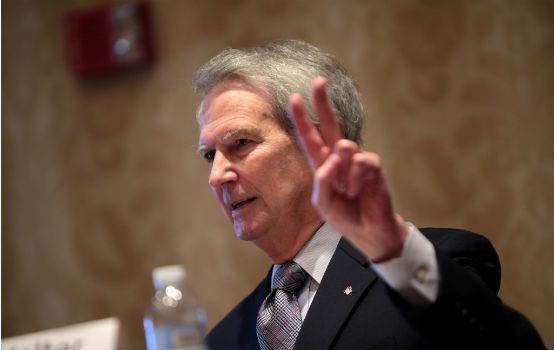Walter Jones and the Road Not Taken

Walter Jones traveled a path familiar to many of his countrymen. After the slaughter of thousands of Americans in the 9/11 terrorist attacks, the Republican congressman from North Carolina wanted to fight back. Representing a military-heavy district, he knew the bravery and patriotism of our men and women in uniform.
Jones voted to pay back those who brought down the Twin Towers and struck the Pentagon. The commander-in-chief of our armed forces then insisted that wasn’t good enough and began a campaign to divert the nation’s anger from Osama bin Laden to Saddam Hussein. In a moment of sorrow and confusion, Jones went along. When France didn’t, he led the crusade to change congressional menus to call French fries “freedom fries.”
There’s a reason Jones, who died Sunday at the age of 76 (on his birthday, tragically), won’t simply be remembered for this Bush-era kitsch. Like many Americans, he came to deeply regret his initial support for the war in Iraq. What he did next was uncommon for a politician, however. He devoted the remainder of his career to atoning for his war vote, confessing to the gravest mistake an elected representative can make.
“I did not do what I should have done to read and find out whether Bush was telling us the truth about Saddam being responsible for 9/11 and having weapons of mass destruction,” Jones later said in a radio interview. “Because I did not do my job then, I helped kill 4,000 Americans, and I will go to my grave regretting that.”
Jones signed more than 11,000 letters to the families of fallen soldiers, starting in 2003, when opposition to the war was almost unthinkable among conservative Republicans in Washington. More importantly, he spent the rest of his time in Congress to reasserting that body’s constitutional war powers, trying to end already ongoing wars that had either dragged on too long or been unjust from the start, and resisting dubious new efforts to spend American blood and treasure abroad.
Even after the folly of Iraq, there was no shortage of new targets. The U.S. intervened to varying degrees in Libya, Yemen, and Syria, all over Jones’s objections. He helped insert into a military spending bill a provision demanding the president seek congressional approval before any preemptive strike on Iran. Democrats, then as now under the leadership of House Speaker Nancy Pelosi, stripped it out despite owing their majority at least in part to an antiwar wave.
This dramatic shift confused some of Jones’s supporters and won him unexpected new allies. Over lunch some years ago, Jones explained to me that he had wanted to hire a communications director right out of college to help them gain experience. When Mother Jones wanted to interview the congressman, he said, the young woman he selected thought it was a Catholic magazine. This prompted another senior Jones staffer to fume about the office giving access to a “left-wing rag.”
The resulting story was no hit piece, however. “The Three Conversions of Walter B. Jones” by (occasional TAC contributor) Robert Dreyfuss touched on the congressman’s journey from Democrat to Republican, Baptist to Catholic, and freedom fries to principled voice for peace. The attention from some of his Republican colleagues, by contrast, was less favorable. He battled hawkish primary challengers for the rest of his political career, defeating two opponents in his final Republican nomination contest and then running unopposed in the general election.
In some ways, Jones was a precursor to Donald Trump. More populist than libertarian, antiwar while unimpeachably pro-military, Jones showed how an Iraq war foe could survive politically in a Southern conservative district filled with veterans and active service members.
A decade after Ron Paul was nearly booed off the debate stage for doing the same, Trump said the Iraq war a mistake as Jeb Bush and Marco Rubio still struggled with their answers to such questions. Trump still won South Carolina, then the Republican nomination and the presidency.
Yet Jones wrapped his humble foreign policy in a personal humility. He approached these questions with decency and far greater consistency, a model of what might have been for the post-Bush Republican Party.
Like the recently deceased (and more widely celebrated) former dean of the House John Dingell, Jones was the son and namesake of a member of Congress. He was a Southern gentleman, soft-spoken and kindhearted in a business that is often boastful and mean.
Any call with the congressman, even to get a quick quote about an upcoming presidential address or a bill up for debate in the House, would be replete with gratitude. “God bless you, Jim,” he would drawl. “Thank you for your friendship over the years.”
Thank you for yours, congressman. And your leadership too.
W. James Antle III is editor of The American Conservative.
Comments